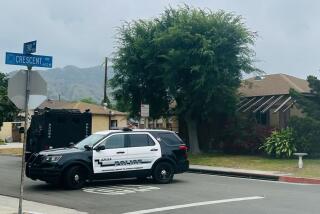Legacy of a flawed martyr
Rodney King used to tell a harrowing story about growing up in Altadena, where he and his three brothers rode their bicycles through the vacant hills behind the nearby Jet Propulsion Laboratory on the weekends. When he was 9, he and his older brother sat astride their Sting-Rays on a rise in the San Gabriels where they saw a Los Angeles County sheriff’s squad car roll to a stop on a dead-end dirt road. Two deputies emerged, pulled what looked to be a young gang member from the back seat and began roughing him up. Rodney and his brother didn’t stick around to watch. They high-tailed it home to tell their father.
King’s father, Ronald, had already begun the day’s drinking out in the garage, in back of the house. He had scant patience with his boys’ wide-eyed horror. That, he told them between swallows from a can of stout malt liquor, was the way things were. If the boys were smart, they’d keep out of the back seat of patrol cars.
There was no way then or now to prove the veracity of Rodney’s story, but it has the ring of truth. Glen, as friends and family called King, was born two months after the assassination of Malcolm X and four months before the Watts riots. He was 3 when the Rev. Martin Luther King Jr. died and a whole new round of rioting scorched African American neighborhoods across the nation. More than 20 years would pass before King’s beating would trigger the next nationally televised race rage.
There is great, aching irony in King’s dying on a day commemorating fatherhood. He left behind three children and outlived his father by five years. Ronald King drank himself to death in a bathtub at the family home. Rodney, who was still in high school, was the one who discovered the body. His father earned his living cleaning office buildings after hours and often brought his sons along to help. Rodney remembered running the vacuum at 3 a.m., watching helplessly while his father opened another can of beer.
Years before his well-documented run-in with police, when the old fear of getting into the back of a patrol car sparked the beat-down seen around the world, King learned to self-medicate like his old man. Expanding beyond his father’s choices, he tried marijuana, PCP, cocaine -- whatever he could acquire to deaden the fear and anxiety, but he always washed it down with alcohol just like Dad. I attended a Narcotics Anonymous meeting with him once, long before he became a sobriety TV star on Dr. Drew Pinsky’s group therapy reality show. King told his story to fellow addicts with genuine emotion that rumbled up and out of the deepest part of him, and he won their empathy and affection. He won mine too.
Rodney Glen King was no angel. He brought much of his trouble on himself. From the first time we met a few years after the 1992 riots, he struck me as a sort of Baby Huey character -- basically sweet-natured but always blundering into one disaster after another. I remember visiting him at his Rialto home days after he’d slammed an SUV into a retaining wall. Judging by the crumpled SUV, he shouldn’t have survived; but there he was, grinning his infectious grin, scooting around in a wheelchair with a busted pelvis, aching to give life one more try.
He never sought the public spotlight. When it found him, he was shy and ill-equipped to cope. Milton Grimes, his first and most supportive attorney, encouraged him to utter the five words for which he will best be remembered. They came from the heart of a frightened 9-year-old whose own father could not protect him from eenie-meanie-minie-moe justice. When he drowned in his own pool on Father’s Day, 20 years after the riots that will always be associated with him, I thought first of all of the drunks before him who gave up on life.
But upon reflection, King’s true legacy shone past the booze and the pills and the reckless, aimless behavior that always haunted him. Can we all get along? Mostly, yes, thanks in some small way to him. And when we can’t, we try harder than we ever did before.
More to Read
Sign up for Essential California
The most important California stories and recommendations in your inbox every morning.
You may occasionally receive promotional content from the Los Angeles Times.









